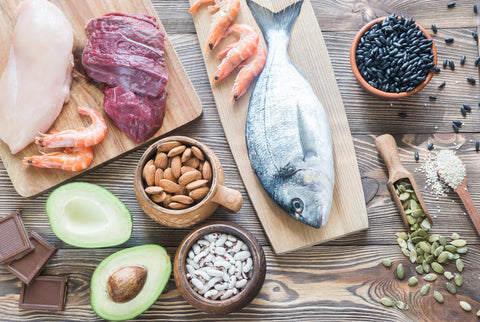Many people know that zinc works as an antiviral and that zinc deficiency can increase susceptibility to viral infections. But zinc has many other functions and, as usual when it comes to minerals in the body, many substances interact with zinc but can also counteract its effects.
Measure zinc levels
Zinc is mostly used intracellularly, i.e. inside the cells of the body's tissues. If a deficiency occurs, the levels in the blood are prioritized - to be able to be redistributed to the places with the greatest need. Therefore, a blood level does not provide the best information if you want to know your zinc status. Hair mineral analysis reflects tissue levels of zinc well over time.
Functions of zinc
Zinc is important for, among other things, vision, skin, wound healing, brain, bone structure. Zinc participates in our endocrine systems, i.e. for all hormones, for a healthy menstrual cycle and fertility and for children to be able to grow normally. Zinc participates in a number of enzyme reactions, including RNA synthesis and thus protein production in the body. The thyroid requires zinc as well as progesterone and sperm production and a healthy prostate.
Zinc and insulin
Zinc is needed for insulin to be available. A lot of zinc is needed for people with uneven blood sugar or diabetes, both type 1 and 2.
Sense of smell and taste
Zinc is quickly needed in viral infections. It can be a reason why the sense of taste and smell deteriorates during or after a flu or cold. Vitamin A, C and magnesium work together with zinc to fight viruses.
Deficiencies or disturbed uptake?
An absolute deficiency means that the intake itself is too low.
A relative deficiency means that the intake is too low in relation to another nutritional factor. If, for example, the use of copper is increased, more zinc in addition to increased copper may be needed to prevent a zinc deficiency from occurring.
An inhibitory substance can interfere with absorption, as phytates do. Phytates are found in coarse fiber such as whole grains and cereals. Directly toxic substances also inhibit zinc and increase the need for zinc, including certain drugs such as cortisone preparations and certain parasite medications. Alcohol increases the body's excretion of zinc.
Environmental toxins such as cadmium, mercury and lead can settle on zinc sites in enzymes, especially when there is already too little zinc available. Having a good mineral status as a foundation protects against toxic substances accumulating in the body.
Too much zinc?
Taking high supplements of zinc unilaterally, without balancing it with the right amount of copper, can cause relative copper deficiency. It is often said that "zinc depresses copper".
But both copper and zinc are required in the right ratio for the formation of collagen and for the inside of the blood vessels to be kept flexible. An excessively high intake of zinc for a long time can cause a copper deficiency to occur and the vessels can then be damaged more easily.
Copper is also needed for the good cholesterol, HDL. So keep an eye on your mineral levels, especially copper, if you take zinc for a long period of time.
Zinc in food
You can also make sure to eat foods that contain good amounts of both easily absorbable zinc and copper. Oysters are a superfood that is available as a food-based dietary supplement . Oysters contain both zinc and copper as well as other nutrients in bioavailable forms.
There is plenty of zinc in beef, reindeer and venison, in offal, cocoa, cheese, pumpkin, sesame and sunflower seeds, in cashews, Brazil nuts and pistachios. Note that seeds as well as nuts and cereals need to be soaked in order for the absorption of minerals to be good. If seeds and nuts are fermented, absorption is even better.
Curious
Yes, it's true: white spots in toenails and fingernails can indicate a zinc deficiency, often a relative deficiency.





